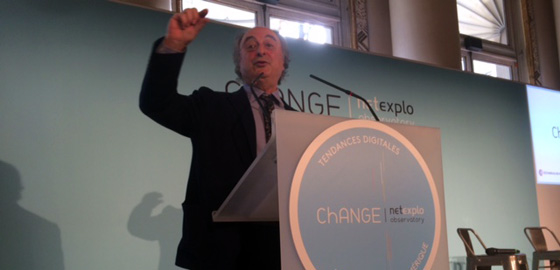How Can Hacking, Design Thinking and Human Error Help Innovation?
The independent observatory Netexplo organized a morning conference on December 16 centered on the necessity of innovation within innovation. But how to go about it? Should business promote the right to error, attempt to hack, maximize one's intuition through Design Thinking or revolutionize innovation through “disruptive” philosophy? These were some of the many questions philosophers, journalists, sociologists, company owners and professors debated at the Hotel Potocki which houses the Chambre de Commerce et de l'Industrie de Paris (CCI). On a chilly and pristine December day, the 12 speakers were invited to its headquarters on Avenue de Friedland to debate the multi-facetted challenges facing innovation.

The Right to Error
"Innovation used to be on the sidelines, now it's at the heart of industry" hammered Alexandre Tissot, program director at the Netexplo Observatory. Also involved in the World Observatory for Digital Innovation, Tissot urged the packed auditorium to reflect on the growing importance of intuition and context when innovating. These simple principles permeated the morning's exchanges with a sense of modesty, according to HEC Paris Emerite professor Laurent Maruani: "Take, for example, these calls for innovation through creative error," he explained to HEC communications after the three-hour conference, "the right to error can lead to audacity, disruption and risk-taking. I found the speakers here encouraging companies to take these leaps. But they also denounced a factor of fear which halts innovation, particularly in institutional companies here in France – hence the emergence of so many start-ups which are signs of rebellion against this conservatise thinking."
Philosopher Charles Pépin has transformed his fascination for the "virtues of failure" into something of an artform, publishing a book of the same name (Les vertus de l'échec, Allary Editions) just this year. The former HEC student electrified the audience with examples as diverse as Raphael Nadal, Charles Darwin, Miles Davis and Charles De Gaulle: "These are people who rebounded from failure... Failure provided them with indicators that they must choose another direction! That Serge Gainsbourg should not become a painter or Darwin a doctor. "You have to fail to exist," Sartre wrote. And sometimes it is your unconscience which wins a battle. " Pépin pursued, "We need people who are creative. Yet their creativity is often born of failure. However, it is what they DO with that failure which is interesting... Failure is a form of resistance. It is by embracing it that you grow".
Ch-ch-changes
The organizers had littered the ornate Hotel Potocki rooms with proverbs on change, drawing from the likes of David Bowie, Gandhi and Socrates. They could have added one by Chinese politician Li Keqiang: "Changes call for innovation, and innovation leads to progress." The need to harness change with qualitative progress has become of the upmost urgency for sociologist Bernard Cathelat. The specialist in lifestyles delivered a somber warning in closing the half-day's event: "We are entering a decade of hyper-conservatism," the bearded veteran explained, "and we must invent a new philosophy for innovation. Creativity must be more "disruptive". That is the only we can reach the dinosaurs running the multinationals and major enterprises."
Cathelat threw out key words for concepts to work on: low-tech, usage, ecology, psychology, pertinence, revolutionary, civic responsibility, and so on. He said our era reminded him of the Seventies. "There wasn't much innovation in those days. Today it's not revolutionary enough. Apple revolutionized just twice, with its computer and its smartphone. But, after that, it just copied its models and focused on marketing. So, there needs to be a rupture, a revolution, even if the dinosaurs don't like it." And he invited innovators to make their products "digestible" for the very diverse populations of the world.
Despite the challenges, Netexplo cofounder, Thierry Happe invited the participants to a follow-up Netexplo conference set for February 24 2017. This bimonthly exchange has become a longstanding feature of the close relationship between HEC Paris, Netexplo and the CCI. For the past six years, they have been studying the digital transformation of French firms through debates between researchers and professionals. The highlight of the year has been the Netexplo Change Awards, rewarding the most important digital innovations initiated by French companies. In June 2016 it was the Alfred application by Nexity which bagged the prestigious Grand Prix. Which innovation could succeed in June 2017?